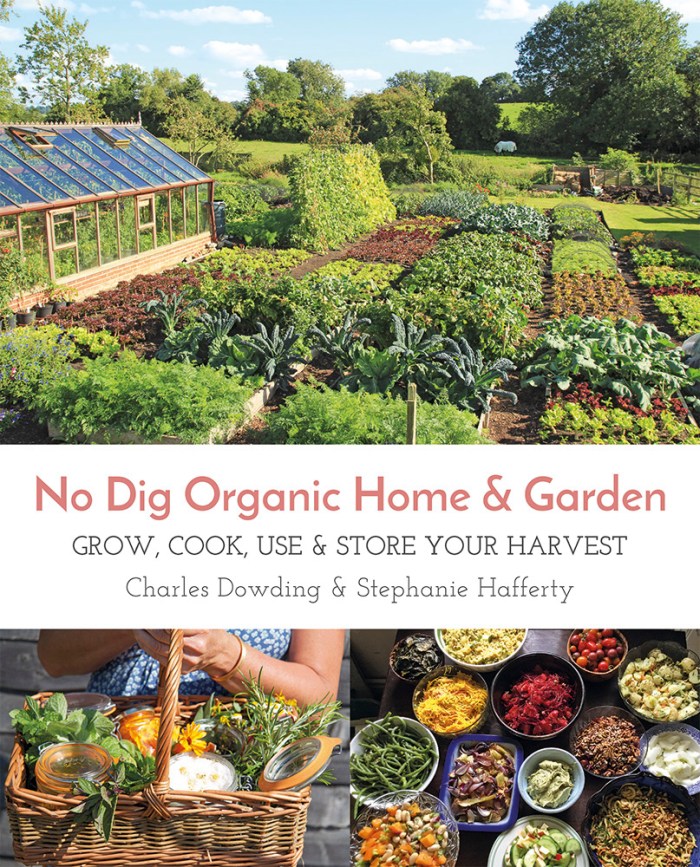If you want me to give you a heads up when the next podcast is out, leave your name and email below (I promise not to spam – I regularly unsubscribe myself because of it…)
Steph is well known for her work with the no-dig gardening method together with her partner – Charles Dowding (listen to our quick chat here). She came to the South West Convergence to promote their new book “No dig organic home & garden” and to give two presentations – one on the no dig method, and the other was this, called “Garden Potions”. I chose to record this instead the no-dig presentation, as it’s not as well known part of what she does as the gardening itself. All preparations in this presentation are discussed in detail in the book, which I would encourage you purchased through their link if it’s of interest (and not through Amazon). Click here to open a new tab with the book page (includes their signatures). I thoroughly enjoyed the presentation! Steph is a knowledgeable, no-nonsense, and witty presenter, and I hope you will find something interesting here for yourself.
Thanks to the Permaculture Association for organising the South West Regional Permaculture Convergence, and thank you for letting me be there to record chats and workshops.
Special thanks go to the sponsors of my trip to the Convergence:
Jo Harold – avid listener, who provides me with constructive feedback. Also has a facebook page (Jo Harold Permaculture) on which she lists useful permaculture links.
Tomas Remiarz – guest to this podcast, book author, and researcher. I’ve turned his pledge upside down, gave him some cash and got a big discount off his book – watch this space for review!
www.macleodorganics.co.uk (Ross McKinstry) – Veg box delivery scheme in Scotland!
Katie Duncan – fellow permaculture designer and practitioner. Thank you Katie!
Marc Pell – podcast listener and now supporter, thank you!
Melanie Ray – personal friend met through exchanging skills locally. Thank you Mel!
Notes
These are just my fast notes; please listen and make your own to get the details.
List of plants and potions
- Soapy liquid made of Soapwort. NOTE: highly invasive. Not edible (apart from flowers). It is naturally soapy. Modern use of this plant is in restoration, as the resulting cleaning fluid is delicate for the ancient tapestry. Boil in water and strain to attain it. Leaves or root can be used. More details in the talk. Can be used for insects on plants, however be certain that you’re not affecting other beneficial insects.
- pyrethrum – can be used to produce an effective insecticide – but be careful not to kill beneficials
- horsetail – liquid can be used as a natural fungicide. Can be used with the soapwort liquid as a cleaner in areas affected by mildew. Can be used as a rinse when washing hair. It’s recommended to handle dried horsetail through gloves. Highly invasive – do not introduce to your garden – forage only.
- Comfrey – for plant feed. Described a method for creating a non-smelly liquid.
- Comfrey oil for its healing properties. Use the fresh or dried root for that with olive oil. Can be used as oil on the skin, or made into salves with wax. Don’t use on broken skin. Lasts about six months.
- Calendula – great edible flower (especially the Lemon Gem Marigolds), great as a tea. Petals can be dried separately (take them off the green stem). They can lift your mood in the middle of winter with their bright colour addition to the salads. Calendula oil (made in the same fashion as comfrey oil) can be used for the skin after working in the sun. If you’re burned, then you need something else, but great for sun-dried skin. Also good for nappy rash.
- Calendula vodka infusion – cleaner for cuts and grazes. Also can be drank in cocktails.
- St. John’s Wort – again invasive. Use the flowers to make an oil infusion. Steph uses it for healing salves for her joints alongside other ingredients.
- Mint, lemon balm, rosemary, parsley, thyme, chamomile – they all have cleaning properties. Put them into a jar, and add vinegar (white or cider, wine, malt) for two weeks, and then strain. It lasts indefinitely. Use as kitchen spray, cleaning the loo, dishwasher softener, descaler
- Lime or lemon peels for use as a descaler. Put into a blender, make into a pulp. Squish all over the scaled areas, wrap with a cloth, and leave for a few hours.
- You can use any citrus peels to make cleaning vinegar.
- Salt, washing soda and herbs make an alternative to Ajax.
Steph’s and Charles’ new bestselling book
All of the above recipes and more can be found on Steph’s blog, and in the new book, which again, if you’re considering getting, buy it straight from the author (click on the image to go to their page):
This is a fledgling project, that is taking a considerable amount of time, and a little bit of money. If you found this informative, entertaining, helpful, and think that it could help someone else, please share using the buttons below. Many thanks!

